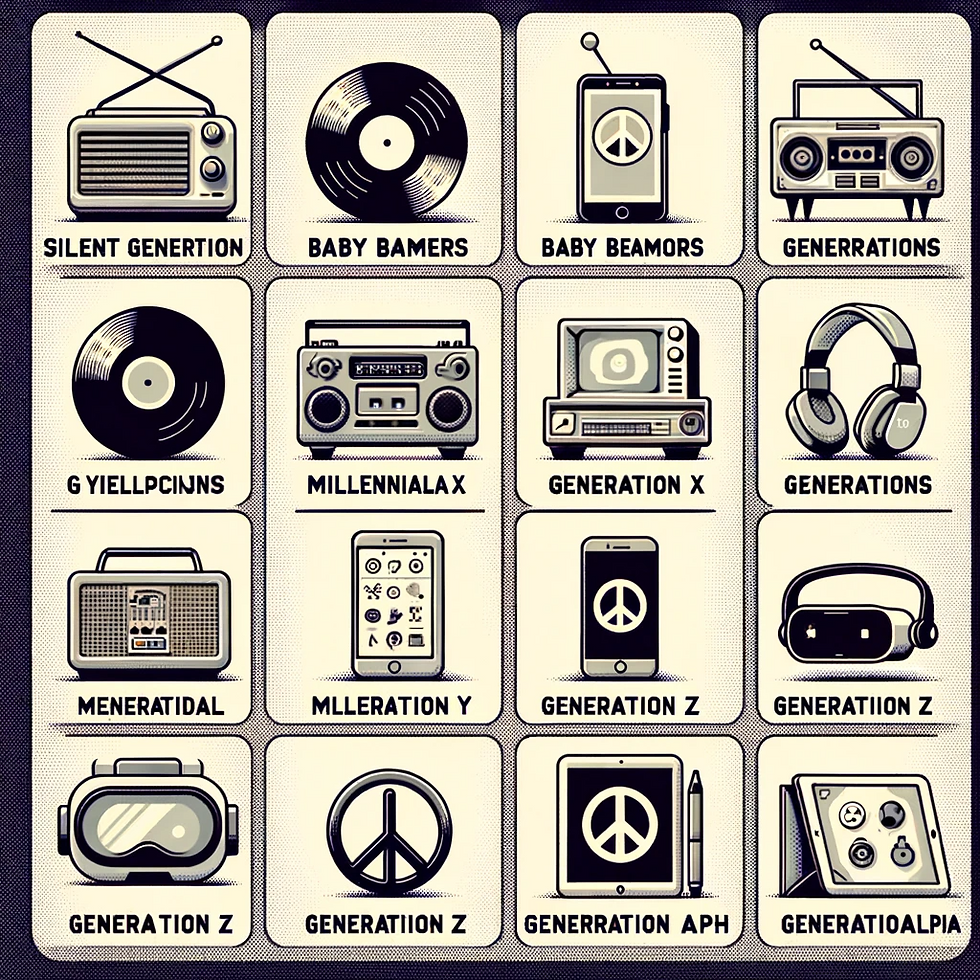The categorization of different generations, particularly in the context of Western societies, typically involves grouping people born within certain time periods who share similar cultural, economic, and social experiences. The most commonly recognized generations are:

1. The Silent Generation: Born between 1928 and 1945, this generation experienced the Great Depression and World War II during their formative years. They are often characterized by their focus on work ethic and conformity.
Challenges: Great Depression, World War II.
Mental Health Issues: PTSD (Post-Traumatic Stress Disorder) from war experiences, depression, and anxiety due to economic hardships. This generation often valued stoicism and may not have sought help for mental health issues as openly as later generations.
2. Baby Boomers: Born between 1946 and 1964, this generation grew up during a time of economic prosperity and social upheaval in the United States and other Western countries. They are often associated with the civil rights movement, the Vietnam War, and the counter-culture of the 1960s.
Challenges: Vietnam War, civil rights movement, Cold War tensions.
Mental Health Issues: Increased awareness of PTSD, especially among veterans; substance abuse; anxiety disorders. The boomers began to challenge the stigma around therapy and mental health discussions.
3. Generation X: Born between 1965 and 1980, this generation is often seen as the first to grow up with modern technologies like personal computers, but also experienced economic downturns and social changes. They are sometimes characterized as more cynical and pragmatic compared to previous generations.
Challenges: Economic downturns, the rise of divorce rates, the AIDS epidemic.
Mental Health Issues: Higher reported levels of depression and anxiety, substance abuse, and eating disorders. Gen X saw a rise in dual-income and single-parent families, which impacted family dynamics and childhood experiences.
4. Millennials (or Generation Y): Born between 1981 and 1996, Millennials came of age during the internet explosion and are often seen as tech-savvy and value-driven, with a focus on social issues and work-life balance.
Challenges: 9/11, the Great Recession, rapid technological change.
Mental Health Issues: Increased rates of anxiety, depression, and stress-related illnesses. Millennials experienced significant economic and job-related pressures, coupled with the rise of social media, which has been linked to mental health issues.
5. Generation Z (or Gen Z): Born from 1997 onward, this generation has been raised in a fully digital world with social media, smartphones, and global connectivity. They are often viewed as more progressive, diverse, and tech-integrated than previous generations.
Challenges: Climate change, social media influence, school shootings, COVID-19 pandemic.
Mental Health Issues: High levels of anxiety, depression, and stress; body image issues; effects of social media on self-esteem and loneliness. Gen Z has been more open about discussing mental health and seeking therapy compared to previous generations.
6. Generation Alpha: This is the generation born after 2010. They are the first generation to be born entirely in the 21st century and are growing up in a highly technologized and interconnected world.
Challenges: Growing up in a highly digitalized world, the aftermath of the COVID-19 pandemic.
Mental Health Issues: It's too early to fully understand the long-term mental health impacts on this generation. However, concerns include the effects of screen time on development, potential for increased anxiety and depression, and the impacts of global issues like climate change.

Each generation has its own unique set of characteristics, influenced by the political, economic, and cultural events of their time. However, it's important to remember that generational labels are broad and cannot fully capture the diversity within any group of individuals.
Each generation's experiences have shaped their views on mental health and their approaches to seeking help. While earlier generations may have been more hesitant to discuss mental health openly, there has been a progressive shift towards greater awareness, reduced stigma, and more proactive approaches to mental wellness in the younger generations.

コメント